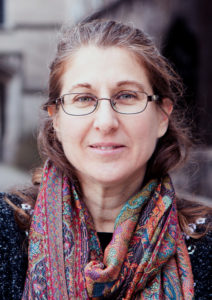by Ittai Eres
 I still remember the first time I encountered Dr. Jocelyn Malamy, Associate Professor in the Department of Molecular Genetics and Cell Biology at the University of Chicago. She was giving the final set of lectures in one of the toughest classes I took my first year of graduate school. Immediately, I was struck by her enthusiasm and vigor, not only for plant biology, but also for the task at hand—teaching. Jocelyn is a past recipient of the Llewellyn John and Harriet Manchester Quantrell Award for Excellence in Undergraduate Teaching, which is no surprise for anyone who’s ever taken one of her classes. She feels that University of Chicago students are a “really gratifying group to work with, because you provide them good exciting things, and then they become excited.” This attitude was definitely reflected in her lectures for that course, which consistently engaged the audience in a way that many educators strive for their whole careers.
I still remember the first time I encountered Dr. Jocelyn Malamy, Associate Professor in the Department of Molecular Genetics and Cell Biology at the University of Chicago. She was giving the final set of lectures in one of the toughest classes I took my first year of graduate school. Immediately, I was struck by her enthusiasm and vigor, not only for plant biology, but also for the task at hand—teaching. Jocelyn is a past recipient of the Llewellyn John and Harriet Manchester Quantrell Award for Excellence in Undergraduate Teaching, which is no surprise for anyone who’s ever taken one of her classes. She feels that University of Chicago students are a “really gratifying group to work with, because you provide them good exciting things, and then they become excited.” This attitude was definitely reflected in her lectures for that course, which consistently engaged the audience in a way that many educators strive for their whole careers.
Small wonder, then, that she was recently promoted to become the Master of the Biological Sciences Collegiate Division (BSCD). In this new administrative role, Jocelyn has been coming up with ways to introduce new opportunities, new curricula, and new courses to students interested in the life sciences. As a result, a new set of research intensive courses will be offered for undergraduates at the Marine Biological Laboratory (MBL) at Wood’s Hole this year in the three weeks preceding the fall quarter.
You might expect that taking on such a large leadership role would cause one to put other professional goals on hold for a period of time, but that isn’t the case here. Jocelyn still runs her research lab, as well, and has big goals to expand into and publish in an exciting new direction: jellyfish. Like plants, jellyfish have a tremendous regenerative capacity—take a piece of either one, and it’s capable of growing into a whole new organism. As Jocelyn herself describes, “you cut them into four pieces, and you get four jellyfish!” Identifying the common elements between such creatures that allow them to regenerate could be a tremendous boon for human health.
Of course, expanding the scope and size of a research lab isn’t easy, especially in today’s funding climate. One thing Jocelyn laments is the constant fight for funding. The need to constantly sell your projects, and to market them to those who lack some interest in basic science questions, can be incredibly frustrating. Not to be deterred, she still searches zealously for those “a-ha” moments when results come through and things finally click. Unlike many other professors, Jocelyn is not content to stay in the office and hear about results from her students. For her, the best way to process a scientific result is to be present for the process that yields it, and hence she can frequently be found working at the bench, physically doing the research. There was certainly a time in her career when a variety of factors conspired to prevent this from being a possibility. Faculty members’ offices are placed outside of the lab, and administrative and teaching demands make it difficult to find the time to do actual science. In her own words: “7 years, I didn’t pick up a pipette, what was I thinking? It was so, so, so wrong, and maybe it works for some people, but it didn’t work for me.”
Jocelyn has also faced more gender-specific challenges during the course of her career, though she did not ever feel she was discriminated against as a woman. “Women,” she says, “are very well-represented in the biological sciences, and almost particularly in plant biology.” However, there is also typically a difference in how men and women approach professional situations, especially ones where you need to fight for yourself or for a certain goal. According to her, often a “typical female ‘softer’ approach leads to less success,” and that, if a woman wants to be more assertive, she often must worry about “trying to hit that right tone…constantly monitoring yourself.” Of course, professional women often have the added challenge of being a scientist while also being a mom. The mother of a young child herself, Jocelyn notes that “having children is a big hit on your productivity, that often affects women much more than it does men.”
Although these different challenges make it harder for women to succeed professionally, they certainly haven’t stopped Jocelyn. She began to do research in her undergrad years at Tufts University, where she fell in love with plant biology before moving on to Rutgers for her Ph.D. and then to New York University for a post-doc. Nowadays, we’re lucky to have her here at the University of Chicago, making new inroads into regeneration with jellyfish in her lab and creating engaging educational content as Master of the BSCD. Her advice for students hoping to be as successful? “Go with something you’re excited about, but also factor practicality into it a little bit.”
